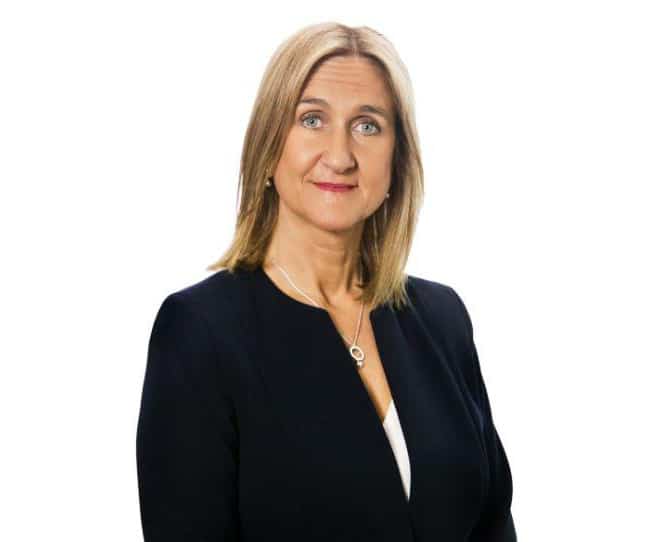Mary O’Dea, Chief Executive of the Institute of Banking
Mary O’Dea is Chief Executive of the Institute of Banking. Mary joined the Institute in April 2018 from the Central Bank of Ireland where she was Director of Securities and Markets Supervision. She was previously Ireland’s representative at the World Bank and prior to that held the role of Alternate Executive Director representing Ireland with the International Monetary Fund. Mary previously held several director roles with the Central Bank of Ireland, including Director of Financial Operations, Consumer Director and acting Chief Executive of the Financial Regulator.
What are your main priorities and goals in your role?
I’m leading a team in Institute of Banking (IoB) in the transformation of our education offerings. IoB is a recognised college of University College Dublin (UCD) and is the leading provider of specialist education to the financial services sector.
We offer a broad range of programmes in the traditional areas of risk, compliance and finance, alongside new offerings in digital transformation and culture.
We also successfully piloted a blockchain solution for our credentialing which is heading into production.
What are your biggest challenges as CEO?
Our biggest challenge is responding to our members’ needs in a rapidly changing financial services industry and enabling their lifelong learning. We have launched digital programmes which provide education on digital product management, digital transformation, and data and analytics.
How do you keep your team/staff motivated?
The team really cares about getting outcomes for members. In carrying out a major business transformation we spent a lot of time together as a team working on ‘Our Story’. This includes a visual reference of what we need to do to execute our strategy and fulfil our purpose.
What are the challenges facing the industry going forward?
The prolonged low interest rate environment, new technologies, and regulatory requirements. We see that technology is reshaping jobs, and many organisations are implementing new structural models.
Digital technology is a challenge in the education sector, specifically how these possibilities can be realised in teaching and learning.
What new trends are emerging in your industry?
The transition to a low-carbon economy is a major theme emerging in Irish financial services. A company’s ESG (environmental, social, and governance) rating is likely to be as important as its credit rating in the next five years.
We also see a trend of moving to more personalised learning. IoB is currently developing an exciting new proposition to support professionals in financial services establish their learning path. It will empower the individual to fuel their progress through engagement with tailored content.
Are there any major changes you would like to see in your sector?
Continuing to re-build trust is paramount for financial services. We are supporting our members through this change with the development and delivery of our new culture programmes. We have two offerings: At level 7, designed to assist our members in developing an effective consumer-focused culture, and level 9, a C-suite offering providing senior managers with the tools to lead effective cultures.
As an employer are you finding any skill gaps in the market?
Compliance and risk skills are still in short supply. We are seeing an increasing demand for our Masterclasses and short sprints courses, such as in the area of wholesale market conduct risk.
With many new firms locating in Ireland, there is a strong demand from senior management and directors for our two programmes – the Certified Bank Director and the Certified Investment Fund Director.
How did your strategy develop in the context of the banking crisis and economic crisis?
Our executive education and culture programmes were developed in response to the crisis. Our new strategy is very focussed on delivering education to improve outcomes for customers of the financial services sector.
How will Brexit affect you, or have you started to feel the effects already?
Brexit creates more opportunities for us as a significant number of firms locating in Ireland allows us to grow our education offerings. We are very conscious that Brexit is likely to impact on our members, and we stay in close contact with them to ensure that we continue to support them in a new environment.
How do you define success and what drives you to succeed?
Delivering on our purpose – to educate the current and future financial services industry workforce, and to enable them to fulfil their true potential in the interests of their customers. I define success broadly and I believe that the only way to achieve anything is by empowering other people. Building an atmosphere of support, challenge, and ambition sets us on the road to success for our members and learners.
What’s the best advice you’ve been given, or would give, in business?
To be your authentic self, which requires you to be in tune with your value system, to question social norms, and to reflect on what feels right for you.
What have been your highlights in business over the past year?
The successful completion of the pilot phase of our collaboration with Deloitte, Bank of Ireland, AIB and Ulster Bank to deliver a blockchain platform – EdQ – that authenticates individuals’ education credentials.
We’ve also revamped our website and member portal – the beginning of a journey to deliver improved services to our members.
What’s next for your company?
We are now in year two of our five-year strategy and we will continue to transform both our offerings to members and the way in which we support that internally. As well as delivering new education products through new channels to new markets, we have ambitious plans to deliver our blockchain platform, along with a more personalised learning experience for our members in 2020.
Where do you want your business/brand to be this time next year?
I look forward to growing our reach in the funds sector, adding to our portfolio for banks, and delivering this to our members. I want IoB to continue to be the place members come to for progressive applied learning that will raise standards in the sector.
We will have also successfully launched our digital credentialing blockchain technology platform, and will be providing a superior education app for our members.





